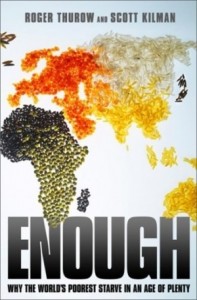I was watching Anthony Bourdain “Parts Unknown-Sicily” the other night, and was amazed at how similar the scene where they slaughtered the pig and then prepared the meat was to the time-honored Eastern North Carolina tradition of “hog killin” on New Year’s Day. I am not planning to slaughter any hogs in the back yard tomorrow, but will have a traditional menu going. Continue reading “My New Year’s Day Menu”
Tag: Food and drink
Life by chocolate
A small upmarket chocolate-maker brings quality labs to cacao bean producers.
From MIT’s magazine Technology Review, a small cockle-warming story by Corby Kummer to curl up with in front of the fire.
A yuppie San Francisco chocolate maker called Tcho has gone beyond selling high-priced speciality chocolate squares.
The company does something new: it provides growers with all the tools they need to have chocolate tastings during harvesting and processing, the crucial period that determines the price a cacao farmer’s crop will command. Tcho combines coffee roasters, spice grinders, and modified hair dryers to equip “sample labs†— pilot plants that produce tiny lots of chocolate right where cacao is grown. The company gives cacao farmers customized groupware so that they can share tasting notes and samples with chocolate makers. In this way, the farmers can bring entire harvests up to the standards of Tcho or any other buyer.
This is big news for the cocoa growers in Ghana, Ecuador, and other poor producing countries. Continue reading “Life by chocolate”
Will House Republicans Save Food Aid Reform?

These next 48 hours are critical for advancing reform of US international food aid, which I have blogged about previously. Short version: because current rules essentially demand that we provide aid in food grown in the US via government subsidy, our current aid regime wastes money, delays delivery of aid by weeks, lines the pockets of agribusiness and big shipping, often undermines farmers in the Global South, and leaves 2-4 million people starving who could otherwise be helped.
The basic answer is to allow food to be procured locally; the Obama Administration’s budget proposal did just that, and was given the back of the hand by special interests in the Senate. The Senate bill, which passed the Upper House, did add some extra money for local procurement, but fell far short of what was really needed. The pathetic justifications offered by the agribusiness and shipping lobbies show just how weak their policy position is.
And now — maybe the House to the rescue. The House? The current House? You gotta be kidding, right?
Wrong. The hero here is House International Relations Committee chair Ed Royce, a very conservative Republican from Orange County, who studied the way food aid rules work, and got outraged. That’s hardly odd for a conservative, because farm policy represents about the clearest case of government waste we have. It didn’t hurt, of course, that allowing for local procurement would also take much food aid from the Agriculture Committee and give it to the IR committee, but that really wasn’t what was happening here: this is an outrage and everyone who looks at it realizes it.
Originally, Royce teamed up with IR Global Affairs Subcommittee ranking member Karen Bass, a liberal African-American Democrat from Los Angeles, to introduce the Food Aid Reform Act, which would allow for local procurement as a general matter. Before the House can vote on that, however, it needs to consider the Farm Bill, so Royce and IR Committee ranking member Eliot Engel (D - NY) have proposed an amendment to the House bill that essentially replicates the Food Aid Reform Act. The House will consider that amendment as early as Wednesday.
Think about that for a second: “the House will consider that amendment as early as Wednesday.” That says a lot. Amendments don’t get considered on the floor of the House unless the Rules Committee allows them to be considered, and the Rules Committee doesn’t allow them to be considered unless it’s okay with the leadership. That means that at least, there is substantial support in the Republican Conference for this measure. GOP to the rescue!
Of course, they should support it. Reforming food aid to allow for local procurement (as well as other crucial reforms) is such a no-brainer that it is perhaps the last genuinely bipartisan policy initiative out there. Don’t believe me? Even the Heritage Foundation favors this. Does that make you as a liberal Democrat get nauseous? Well, me too, sort of, but the same reforms are backed by the Center for American Progress.
So now — which is to say, right now, as soon as the business day starts in Washington DC — call your Congresscritter and ask them to support the Royce-Engel Amendment (#55) to the Farm Bill. After the jump, I’m including the talking points prepared by the American Jewish World Service, which in conjunction with lots of other charities like Bread for the World, Oxfam, Catholic Relief Services, and many others, has spearheaded this campaign. You should drop a dime for them, too, by the way.
But really: call. write. E-mail. This means life or death for people. Do it.
**************************
I’m writing, as a constituent and as a supporter of American Jewish World Service <http://www.ajws.org/>, to urge you to vote YES on the Royce-Engel Amendment (#55) when it comes up during the Farm Bill debate this week.
The bi-partisan Royce-Engel Amendment (#55) to the Farm Bill would make significant and urgently needed reforms to our international food aid system by creating more flexibility and ending the practice of monetization, while also saving taxpayer dollars by eliminating wasteful spending.
While U.S. food aid saves millions of lives, we know all too well that the system is flawed. Current law requires that our government ship the majority of our food aid from the U.S., which means that it can take many months to reach people who need it. And since we buy almost none of the food from farmers in the countries we’re helping, our aid often undercuts local prices and even puts local farms out of business.
As you may recall, President Obama made recommendations in his 2014 budget proposal to address some of these challenges. The Royce-Engel Amendment essentially codifies the president’s proposal into law by allowing 45% of U.S. food aid to be in the form of local purchase, cash or vouchers. This flexibility would enable us to reach at least 4 million more people, with the same dollar amount, and would eliminate delivery delays of 3-4 months that are often the difference between life and death.
The amendment also ends the requirement that some portion of food aid be ‘monetized’ - a system through which in-kind food aid is donated to international development organizations, which in turn sell the food in local markets overseas to raise money for their development projects. Ending monetization creates the flexibility to use cash instead of commodities for important development projects financed through the food aid program.
A large coalition of groups support this amendment including AJWS, Oxfam, Bread for the World, Save the Children, CARE, Catholic Relief Services and many others. Think tanks across the ideological spectrum have also endorsed food aid reform, from the Heritage Foundation to the Center for American Progress.
I believe ending global hunger is a moral imperative and a fiscal priority. I urge you to vote YES on this amendment and to help make history on this issue.
“How to Legalize Pot”
Bill Keller on mj legalization: Can we get to “orderly market” without passing through “way too stoned”?
Remind me to talk to Bill Keller more often. Not many reporters will expend the effort to understand the nuances of a complex issue and make them understandable to non-specialist readers. Key quote: “Can we get to ‘orderly market’ without passing through ‘way too stoned’?”
US Food Aid Rules: If You’re Not Outraged, You’re Not Paying Attention
 The Obama Administration announced yesterday that it wants to change US food aid rules to allow for more “local procurement†of food aid in the countries that need it. Predictably, the special interests are aghast. But the administration is right: current food aid rules are among the most egregious special interest legislation in the world right now, preventing this country from stopping starvation, often helping it, wasting taxpayer money, increasing greenhouse gas emissions, and causing soil degradation in Africa. I have been working on this issue for the last couple of years with the American Jewish World Service, one of the world’s best charities: ending the current rules is a win-win-win-win all around, which is why it will probably be a fight to accomplish it. The most important source on this issue is Roger Thurow and Scott Kilman’s outstanding book Enough: Why the World’s Poorest Starve In An Age of Plenty. Run, don’t walk, and go and read it. But in the meantime, here is what you need to know.
The Obama Administration announced yesterday that it wants to change US food aid rules to allow for more “local procurement†of food aid in the countries that need it. Predictably, the special interests are aghast. But the administration is right: current food aid rules are among the most egregious special interest legislation in the world right now, preventing this country from stopping starvation, often helping it, wasting taxpayer money, increasing greenhouse gas emissions, and causing soil degradation in Africa. I have been working on this issue for the last couple of years with the American Jewish World Service, one of the world’s best charities: ending the current rules is a win-win-win-win all around, which is why it will probably be a fight to accomplish it. The most important source on this issue is Roger Thurow and Scott Kilman’s outstanding book Enough: Why the World’s Poorest Starve In An Age of Plenty. Run, don’t walk, and go and read it. But in the meantime, here is what you need to know.
In order to see how egregious current rules are, suppose that there is a famine in Ethiopia (I know, hard to do). the quickest and most effective thing to do would be to find some farmer or group of farmers in other parts of the country, or in neighboring countries, buy their food and get it to the stricken area. After all, one key cause of famine is the lack of money, not lack of crops. But under current law, USAID is basically forbidden from doing that. Instead, it must buy grain in the United States and ship it several thousand miles to the famine area. You can imagine the amount of time that that takes; sometimes, several weeks. it’s a logistic nightmare. In the meantime, thousands die, usually the weakest such as children and the elderly.
But it’s worse than that.
If the food needs to be shipped, then that means that the shipping must be paid for. And it sure is: according to a study done by AJWS and Oxfam, nearly 55% of the cost of American international food aid goes not to food, but to shipping costs. That’s what your tax dollars are going to.
But it’s worse than that.
Just because a ship is flagged American, doesn’t mean that the sailors on it are American. Hundreds of ships have been flagged under Liberian registry for years, and during much of that time, there was no “Liberia†to speak of. So your tax dollars are not necessarily going to American jobs, and probably are not.
But it’s worse than that.
Recall, of course, that the food that will be shipped to the famine area is subsidized, so in fact, we are spending food aid money not on people who are starving, but on relatively wealthy American farmers.
But it’s worse than that!
Once the food finally makes its way to the country in question, not all of it gets to the famine area. Free food from the United States is simply too attractive to smugglers, who siphon it off and then sell it in markets. I personally have several instances of markets selling food in bags stating quite clearly: “GIFT OF THE PEOPLE OF THE UNITED STATES OF AMERICA: NOT FOR RESALE.â€Â You can it in markets throughout Africa. And what that does is put local farmers out of business because they cannot compete with this illegally dumped food from the United States. in other words, by this sort of dumping, in many instances, we are actually making the problem worse over the long term because we are undermining other countries’ ability to feed themselves. Ikal Angelei, whom I blogged about several months ago, told me that in her village in Kenya, they used to have enough supplies to last for several months in the event of a famine. Now, in no small part because of the dumping, the village only has a few days’ worth. This is not-not-not to say that there should not be food aid, but rather that it needs to be done effectively and efficiently.
But it’s even worse than that!
The inability of local farmers to farm the land means that the topsoil begins to erode. Native farming techniques were hardly environmentally perfect, and caused damage, but the failure to farm at all often mean environmental degradation. So when we hear that “Africa Is Dying,†as I did back in 2010, we should know that we are part of the problem.
That’s pretty awful isn’t it? And the really shocking thing is just how little it gets us. James Caponiti, the executive director/lobbyist of the American Maritime Congress, claimed in the NYT article that moving to local procurement could cost the United States “hundreds of jobs.â€Â Hundreds? That’s what he claims? Hell, we could end the sequester and write a bigger transit bill and multiply that over several times. And that’s taking his argument at face value. One remembers Muhammed Ali’s famous taunt to George Foreman in Kinshasa: “Is that all you got, George? Is that it?â€
My friend Timi Gerson, AJWS’ advocacy director, is quoted at the end of the article: “From a taxpayers’ and policy perspective, the food aid program is clearly in need of reform. The only thing getting in the way is politics and special interest.â€Â Absolutely, 1 million percent true. Call your Congressmember and tell them how important it is to support the administration.
It will be very interesting to see what evangelicals and so-called fiscal conservatives do on this issue. Very interesting indeed.
Beer
Keith’s post reminds me that I love almost everything about beer except drinking it (on the latter, I like it with spicy food or on hot summer afternoons, but as often as not I’d be equally happy with a nice cold glass of milk or lemonade). As a beer is any fermented grain [fermented fruit is wine; I don’t know whether the precursor of rum - fermented cane juice - is technically a beer or a wine or what], it can be steered to a lot of different futures, including distillation into whiskey or vehicle fuel, or all the interesting craft brew variations between American mass-market lager and opaque stout.
What I love about beer is its commercial history and marketing. Ever wonder why so many tropical countries with distinctive cuisines have domestic beers that all taste pretty much the same? The revolution of 1848 sent German refugees all over the world, including a lot of brewers who got off the boat in places like Rio and said “what this country really needs is some good beer…I think I’ll write home to cousin Fritz; if he can send me a boatload of hops, I could make a bunch of it.”
